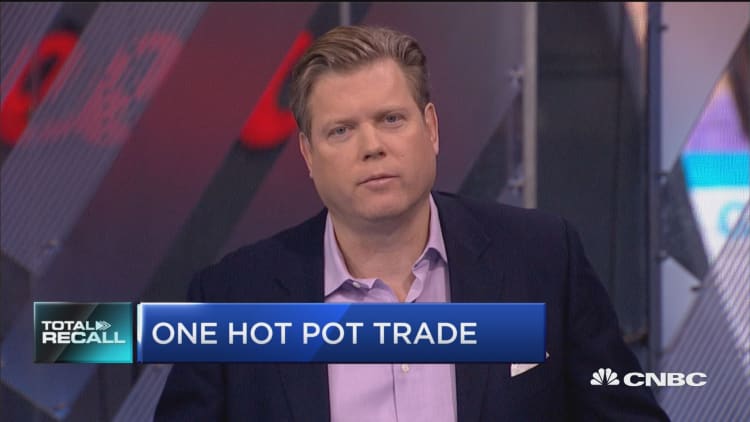No matter who wins on Election Day, cannabis will have a big day at the ballot box.
Five states — Arizona, California, Maine, Massachusetts and Nevada — have initiatives to legalize marijuana for adult recreational use. Four states — Arkansas, Florida, Montana and North Dakota — have proposed legalizing marijuana for medical purposes. All of the recreational use initiatives are currently ahead in the polls.
They will not be alone. Twenty-five states and the District of Columbia have legalized the possession and distribution of marijuana for medical purposes, and four states — Washington, Oregon, Alaska and Colorado — have legalized adult recreational use. (See map below.)
Legal marijuana sales are projected to reach $20.6 billion by 2020 from $7.4 billion now, with a compound annual growth rate of 29 percent, according to Arcview Market Research, a San Francisco-based cannabis research firm.
If November's ballot initiatives pass in Arizona, California, Florida, Maine, Massachusetts, Montana and Nevada, these states alone will account for $2.7 billion in additional sales in 2018, growing to nearly $8 billion by 2020, Arcview estimates.
For investors, the rising prospects of legalized pot may be too good to pass up, yet the publicly traded cannabis companies may not be such a smart bet.
"These are very risky stocks and not all of them are going to survive," said Dan Nicholls, vice president of the Marijuana Index, a benchmark that tracks U.S. and Canadian stocks that are involved in the industry.
Fraudsters often exploit the latest innovation, technology, product or growth industry – in this case, marijuana – to lure investors with the promise of high returns.Securities and Exchange Commission

Public companies in the cannabis business are a highly speculative bunch. Most shares trade over the counter and do not have to file audited financial reports with regulators. In 2014, the Securities and Exchange Commission suspended five cannabis companies for fraud.
"Fraudsters often exploit the latest innovation, technology, product or growth industry — in this case, marijuana — to lure investors with the promise of high returns," SEC officials said in the investor alert about cannabis stocks.
That is not to say that all marijuana-related companies are suspect.
British biotech company GW Pharmaceuticals, the largest stock on the Marijuana Index with a market capitalization of $2.8 billion, has a promising cannabis-based drug pipeline, according to Goldman Sachs, which gave the company a buy rating this month.
The Marijuana Index, which began in January 2015, is only a small slice of publicly traded cannabis stocks. To be included, stocks need to have a market capitalization of at least $10 million, a daily trading volume of $20,000 and a share price above 10 cents.
Only 23 stocks have made the cut, out of nearly 200 similar stocks that trade on exchanges and over-the-counter markets in the U.S. and Canada. The average stock on the index has a market capitalization of $263.9 million and a share price under $4.
Returns for cannabis stocks have been volatile. The Marijuana Index is up more than 180 percent this year, but plunged 57.2 percent in 2015. (See chart below.)
Marijuana stock performance is "mostly correlated," which means individual company stocks often rise and fall in lockstep with the broader industry, Nicholls said.
Even with the strong correlation, investors are better off buying a basket of marijuana stocks rather than taking a flier on one company, Nicholls said. "It's really hard to say right now how much these companies will be worth," he said, because the cannabis market is very competitive, faces a lot of regulatory challenges and could dramatically change if larger companies were to enter it.
Usually, if investors want exposure to a risky industry without picking stocks, they would buy an exchange-traded fund, which tracks stocks in a particular sector. Unfortunately for cannabis investors, there is no marijuana ETF.
That doesn't mean pot investors have to choose among GW Pharmaceuticals, penny stocks or nothing at all.
Some analysts recommend investors hold stocks of companies that supply the booming marijuana industry. For example, lawn-care products maker Scotts Miracle-Gro has been acquiring hydroponics businesses over the past year.
"The hydroponics market taps into marijuana demand and the company now has a growth option that we think an investor is able to capture for about the price of the traditional business," wrote JPMorgan analyst Jeffrey Zekauskas about Scotts Miracle-Gro in an Aug. 4 note to clients. The stock is up 32.7 percent so far this year.
Whatever route you take to investing in cannabis stocks, prepare for a long, strange trip.


